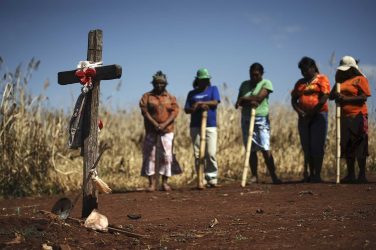Members of Brazil’s Chamber of Deputies should think of Luan Gabriel de Souza’s death when they vote, in the next few weeks, on a bill (PL 4,471/2012) that could improve investigations of killings by police.
Luan was a rail-thin 14-year-old who was scared of the cockroaches in Parque João Ramalho, a poor neighborhood in São Paulo’s metropolitan area where he lived, and where cockroaches are plentiful.
A good student, Luan was well-liked by his teachers and dreamed of being a doctor. His mother, a cook at a hospital, promised him she would do her best to save up for his college tuition.
Luan’s father had died in 2012, and his 23-year-old brother, Lucas, had stepped up to care for him. “I am a father for him. He is like my brother and my son,” Lucas told me, in the present tense, as if Luan’s death had not sunk in.
Luan and Lucas were inseparable.
Last Saturday was the first time Luan slept away from home, at his best friend’s house. On Sunday, Luan and his friend went to buy a snack at a nearby store. On their way back through an alley, they stopped to say happy birthday to a boy who was turning 15. About eight other children were there.
As they were standing there, at around 3 pm, Alécio José de Souza, a military police officer, appeared at the end of the alley and fired three shots, according to witnesses. One hit Luan in the neck, and he died in the alley.
Lucas ran to the scene when he learned of the shooting, he told me. He saw the police officers move a motorcycle that turned out to have been stolen close to his brother’s body, to incriminate him. A witness told him the officers had turned the body face up, so it would not be immediately evident that Luan had been shot from behind.
The officers did not let Lucas or his mother identify the body. “It isn’t your son, go home,” they told his mother, Lucas recalled. They went up to the second floor of a neighbor’s house, where they could see the scene. A gust of wind raised the plastic over the corpse, and they recognized the shoes.
At the civil police station, de Souza and his partner offered their version of events. They said they had seen people dismantling a stolen motorcycle they were looking for, and chased them, according to the police report. They said de Souza only fired his three shots after a 20-year-old man fired a .38-caliber gun at the officers.
But de Souza’s partner never fired his weapon. A witness said the partner stayed in the car, a fact not mentioned in the report. The civil police, who were responsible for investigating the incident, did not interview the officers separately.
No gun was ever found. Police briefly detained a 21-year-old and a 18-year-old, but they let them go for lack of any evidence against them.
Two witnesses later told a reporter that the military police officers threatened to beat them if they offered details that incriminated the officers in Luan’s killing.
Lucas went to the civil police station at around 7:30 pm on the day of the killing, he said. At that time the military police officers were still inside, giving their statements, according to the police report. But the civil police refused to interview Lucas. They told him to come back the next day.
The civil police registered the killing as “resistance and homicide during a police operation.”
The killing of Luan is exceptional not because of the glaring evidence of a police cover-up but because a lawyer representing a state human rights agency went to the news media. Human Rights Watch has documented scores of similar cases during the past decade — cases in which police officers in Brazil’s slums illegally use lethal force, and then cover it up.
The only way to end such practices is through prompt, thorough and impartial investigations, and a commitment from prosecutors that they won’t let police officers off the hook.
The bill before Congress is important in that it would obligate police to give the family of the deceased a copy of the coroner’s report. It would also require them to inform public defenders and prosecutors of a police killing immediately.
The involvement of prosecutors from the very beginning is crucial in such cases, as the first hours and days are key to collecting enough evidence for a successful investigation. Today in Brazil, prosecutors typically learn of a police killing ridiculously late—30 days or more after the fact, prosecutors informed.
The bill also reinforces procedures that the police should be performing but often do not, such as taking photographs of the body and conducting forensic analysis at the scene of the crime.
Police killed 4,224 people in 2016 in Brazil. Some of those killings were the result of acts of legitimate defense by police, but too many were not.
We do not even know the names of all those killed. But we know Luan’s.
Members of Congress should honor Luan by approving the bill.
César Muñoz is a senior researcher at Human Rights Watch in Brazil. Senior Researcher, Brazil






